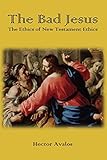The Bad Jesus : the ethics of New Testament ethics / Hector Avalos.
Material type: TextSeries: Bible in the modern world ; 68.Publication details: Sheffield : Sheffield Phoenix Press, c2015.Description: xiv, 461 p. ; 24 cmISBN:
TextSeries: Bible in the modern world ; 68.Publication details: Sheffield : Sheffield Phoenix Press, c2015.Description: xiv, 461 p. ; 24 cmISBN: - 9781909697799
- 1909697796
- 9781909697737
- 1909697737
- 241 23 AVA
- BS2417.E8 A935 2015
| Item type | Current library | Call number | Status | Barcode | |
|---|---|---|---|---|---|
 Books
Books
|
Bishop Bukenya Library Closed Access l Short Loan | 241 AVA (Browse shelf(Opens below)) | Available | 159571 |
Includes bibliographical references and index.
Introduction -- The unloving Jesus : what's new is old -- The hateful Jesus: Luke 14:26 -- The violent Jesus -- The suicidal Jesus: the violent atonement -- The imperialist Jesus: we are all God's slaves -- The anti-Jewish Jesus: socio-rhetorical criticism as apologetics -- The uneconomic Jesus as enemy of the poor -- The misogynistic Jesus: Christian feminism as male ancestor worship -- The anti-disabled Jesus: less than fully human -- The magically anti-medical Jeus -- The eco-hostile Jesus -- The anti-biblical Jesus: missed interpretations -- Conclusion: The ethics of New Testament ethics -- Appendix.
Did Jesus ever do anything wrong? Judging by the vast majority of books on New Testament ethics, the answer is a resounding No. Writers on New Testament ethics generally view Jesus as the paradigm of human standards and behaviour. But since the historical Jesus was a human being, must he not have had flaws, like everyone else? The notion of a flawless human Jesus is a paradoxical oddity in New Testament ethics. According to Avalos, it shows that New Testament ethics is still primarily an apologetic enterprise despite its claim to rest on critical and historical scholarship. The Bad Jesus is a powerful and challenging study, presenting detailed case studies of fundamental ethical principles enunciated or practised by Jesus but antithetical to what would be widely deemed 'acceptable' or 'good' today. Such topics include Jesus' supposedly innovative teachings on love, along with his views on hate, violence, imperialism, animal rights, environmental ethics, Judaism, women, disabled persons and biblical hermeneutics. After closely examining arguments offered by those unwilling to find any fault with the Jesus depicted in the Gospels, Avalos concludes that current treatments of New Testament ethics are permeated by a religiocentric, ethnocentric and imperialistic orientation. But if it is to be a credible historical and critical discipline in modern academia, New Testament ethics needs to discover both a Good and a Bad Jesus.
There are no comments on this title.
